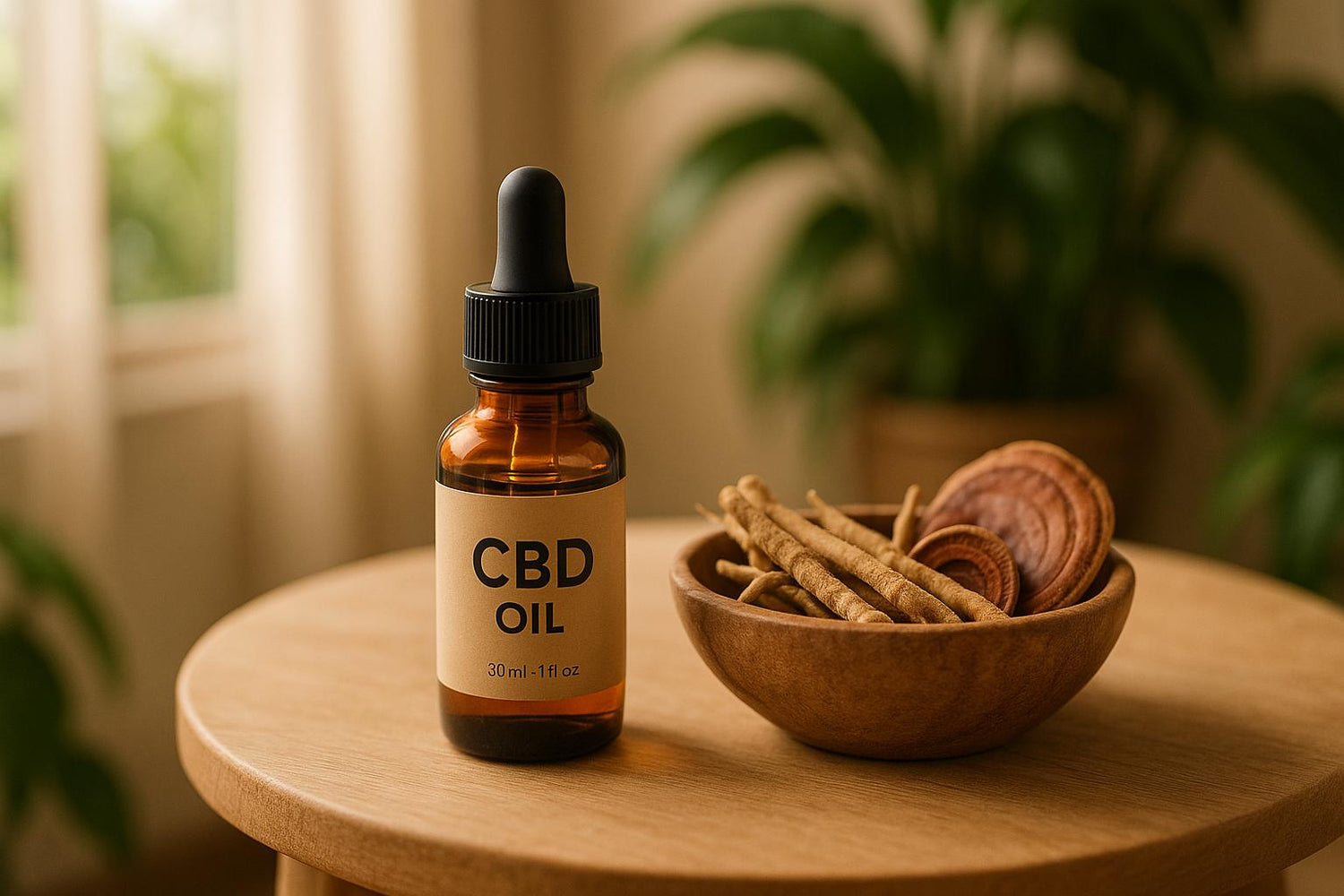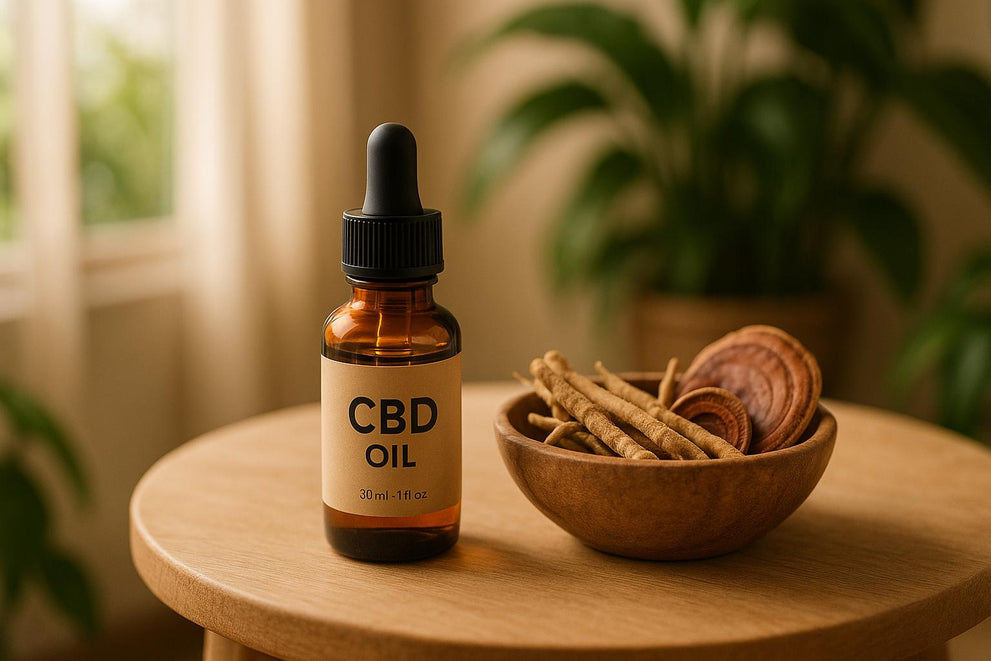Looking for natural pain relief? Combining CBD and adaptogens could be the answer. These two remedies tackle pain and stress from different angles:
- CBD: Reduces inflammation and pain through the endocannabinoid system.
- Adaptogens: Help your body handle stress, which often worsens pain.
Together, they create a balanced approach to managing chronic, inflammatory, and stress-induced pain. For example, pairing CBD with ashwagandha targets chronic pain, while CBD and turmeric address inflammation. Stress-related pain? Try CBD with rhodiola.
Start small, adjust doses gradually, and choose high-quality products for the best results. This combination doesn’t just mask symptoms - it works on the root causes of pain and stress.
Want to know how to use them effectively? Read on for tips on dosage, timing, and product recommendations.
What are adaptogens? An evidence-based guide on stress and supplements.
How CBD and Adaptogens Work Together for Pain Relief
CBD and adaptogens take different paths to help manage pain, but they complement each other beautifully. CBD targets the endocannabinoid system (ECS) to reduce inflammation, while adaptogens focus on balancing the stress response. Together, they create a more holistic approach to pain relief by addressing both inflammation and stress.
CBD's Role in Reducing Pain
CBD interacts with the ECS, a system in your body that regulates pain, inflammation, and more. Scientists have found that the ECS often becomes imbalanced in many diseases, including chronic pain, diabetes, cancer, and even sleep disorders.
In fact, Pal Pacher and George Kunos from the U.S. National Institutes of Health (NIH) noted in 2013:
"Modulating endocannabinoid system activity may have therapeutic potential in almost all diseases affecting humans."
CBD helps by increasing levels of anandamide and 2AG, which are compounds that activate cannabinoid receptors and balance CB1 and CB2 receptor activity, key players in pain relief. It also has powerful anti-inflammatory effects. For example, a 2023 study showed that CBD reduced inflammation after intense exercise compared to a placebo. For conditions like rheumatoid arthritis, CBD not only reduces inflammation but may also improve cell health and work alongside other medications.
While CBD directly tackles pain and inflammation, adaptogens focus on reducing the stress that can amplify pain.
How Adaptogens Affect Pain and Stress
Adaptogens work by helping your body manage stress more effectively. They target the hypothalamus, pituitary, and adrenal glands - collectively known as the HPA axis - which control the body's stress response.
When stress levels rise, cortisol increases, often leading to inflammation that worsens pain. Adaptogens step in to regulate this response, extending the body's ability to handle stress. They also reduce stress-induced inflammation by influencing key molecular pathways and stimulate growth factors that protect cells from damage.
By making the body less sensitive to stress, adaptogens not only improve stress tolerance but also help the body recover faster from stressful events. Since stress can heighten pain signals, lowering stress levels with adaptogens creates a better foundation for pain management.
The Combined Effects: Better Pain Relief
When CBD and adaptogens are used together, their effects amplify each other. CBD reduces inflammation and modulates pain signals through the ECS, while adaptogens regulate stress hormones and prevent stress-related inflammation. This dual approach provides more comprehensive pain relief.
"When CBD and Reishi mushrooms are combined, the benefits multiply. First, both CBD and Reishi mushrooms increase a molecule in our body called 5HTa, better known as Serotonin. Serotonin is one of the neurotransmitters that affect our happiness and stress response."
Full-spectrum hemp extract takes this even further by balancing the ECS, which helps regulate multiple systems in the body - not just the stress-related HPA axis. This integrated approach doesn’t just mask pain; it addresses both the immediate inflammation and the underlying stress that can make pain worse over time.
Choosing the Right Adaptogens for Different Types of Pain
Pairing adaptogens with CBD can help fine-tune pain relief based on the type of discomfort you're dealing with. By combining the unique properties of adaptogens with CBD, you can create a more targeted approach to managing chronic, inflammatory, or stress-induced pain.
For Chronic Pain: Ashwagandha and CBD
Ashwagandha stands out as a great partner for CBD when it comes to tackling chronic pain. This duo addresses both the physical and emotional toll of long-term pain conditions.
Research highlights that ashwagandha and CBD together may help with stress relief, mood improvement, cognitive function, inflammation reduction, pain management, and immune support. Ashwagandha’s anti-inflammatory and pain-relieving properties make it particularly effective.
In one 12-week study, 60 participants with knee pain experienced noticeable improvements in pain, stiffness, and mobility after taking ashwagandha root extracts - with results seen as early as four weeks. Considering that over 32.5 million Americans live with osteoarthritis, these findings are especially relevant.
For those with rheumatoid arthritis, additional studies suggest that ashwagandha may help reduce pain and inflammation. If you're new to this combination, start with a low dose of both ashwagandha and CBD oil, increasing gradually while keeping track of how your body responds.
Now let’s look at the best options for inflammatory pain.
For Inflammatory Pain: Turmeric and CBD
For arthritis, joint pain, or other inflammation-related issues, turmeric paired with CBD can be a powerful solution. While CBD works through the endocannabinoid system to control inflammation, turmeric helps block the release of pro-inflammatory molecules.
A study published in the Journal of Pain Research found that curcumin, the active compound in turmeric, significantly reduced pain and improved physical function in osteoarthritis patients. Some research even suggests that curcumin supplements can rival certain nonsteroidal anti-inflammatory drugs (NSAIDs) in managing joint pain and inflammation.
CBD and curcumin are thought to work better together, amplifying each other's effects. Interestingly, CBD oil may also enhance the body’s ability to absorb curcumin.
For the best results, try taking CBD oil sublingually by placing it under your tongue and letting it absorb before swallowing. Pair this with a high-quality turmeric supplement. You can also apply a CBD-infused cream or gel directly to areas of inflammation for additional relief.
Next, we’ll explore how to address pain linked to stress.
For Stress‑Induced Pain: Rhodiola and CBD
When stress causes muscle tension, headaches, or heightened pain, rhodiola can be an effective companion to CBD. Known for its ability to reduce fatigue, anxiety, and depression, rhodiola also helps improve performance in high-pressure situations. This is especially relevant given that nearly half of Americans (47%) have reported increased stress levels since the start of the pandemic.
A 2020 study found that participants with mild to moderate depression who took rhodiola capsules - either alone or with sertraline - showed greater improvements in mood compared to those on a placebo.
The combination of rhodiola and CBD interacts with the hypothalamic-pituitary-adrenal (HPA) axis, which plays a key role in managing the body’s stress response. Regular use may help provide consistent relief from stress-induced pain.
Before starting any new supplement routine, including CBD and adaptogens, consult with a healthcare professional. Always opt for high-quality products from reputable brands that provide third-party lab testing to ensure safety and effectiveness.
sbb-itb-0d19bd1
How to Use CBD and Adaptogens Together
Combining CBD and adaptogens can offer a powerful approach to pain relief, but using them effectively requires careful attention to dosage, timing, and absorption. Fine-tuning these aspects can make a big difference in how they work for you.
Finding the Right Dosage
Getting the dosage right takes some trial and error. Start small and gradually work your way up. For CBD, experts suggest beginning with 20 to 40 mg daily and increasing by about 5 mg each week until you notice relief. Keep track of how much you're taking and any changes in your symptoms - this can help you determine what works best.
Adaptogen dosages vary depending on the specific plant and its form. For example:
- Ashwagandha: Typically 1 to 6 grams of dry root daily or 500 mg of standardized extract twice a day.
- Rhodiola: Commonly used in doses of 200 to 600 mg per day.
- Holy basil: Often effective at 300 to 600 mg daily.
Check the label on your supplements for guidance, and consider starting with doses that align with clinical studies. Keep in mind that adaptogens may lose their effectiveness after six months, so monitor how your body responds and adjust as needed.
Timing for Best Results
When you take CBD and adaptogens can influence how well they work. Since they complement each other, you can create a schedule that fits your needs. For example:
- Morning: Taking CBD with energizing adaptogens like rhodiola can help improve focus and energy levels.
- Midday: A dose during a busy afternoon may help manage stress and anxiety.
- Evening: Taking them 30 minutes to an hour before bed can promote relaxation, ease pain, and support better sleep.
You can also split your doses throughout the day for steady stress relief. Pay attention to how timing affects your mood, sleep, and pain levels, and adjust your routine accordingly. CBD interacts with your endocannabinoid system while adaptogens work to bring balance, so finding the right schedule can make a noticeable difference.
Improving Absorption
To get the most out of CBD, focus on improving its absorption. When taken orally, CBD has a bioavailability of just 10% to 20%, but using certain methods can boost this significantly. Sublingual consumption (placing it under your tongue) increases absorption to around 35%. Pairing CBD with high-fat foods - like avocado, nuts, or peanut butter - can also help, as CBD is fat-soluble. Research shows that taking CBD with food can raise its bioavailability up to five times compared to taking it on an empty stomach.
For even better results, consider MCT oil or water-soluble CBD products that use nanotechnology to enhance absorption. A study on rats found that combining CBD with sesame oil increased bioavailability by 2.5 to 3 times, with CBD levels jumping from 87 ng/mL to 308 ng/mL. Adding black pepper to your routine may also help, as its active ingredient, piperine, improves CBD uptake.
Before starting any new supplement regimen, consult a healthcare provider - especially if you have medical conditions or take other medications.
Diet Smoke's Role in Pain Management

When it comes to easing pain with CBD and adaptogens, the quality of the products you choose makes all the difference. Diet Smoke stands out by offering premium, lab-tested CBD products designed to complement natural wellness practices like adaptogen use.
Diet Smoke's Lab-Tested CBD Products
Diet Smoke prides itself on delivering high-quality, lab-tested CBD offerings that work with your body's endocannabinoid system - an essential player in pain regulation. Their rigorous testing ensures that each product matches what's promised on the label, giving you confidence in your approach to holistic pain relief.
As highlighted in their product descriptions, "CBD is making waves in the health and wellness industry, too. These bite-sized treats packed with a powerful dose of CBD soothe discomfort by interacting with the body's endocannabinoid system, which plays a key role in pain regulation".
All of Diet Smoke's CBD gummies are vegan, gluten-free, and dairy-free, making them suitable for various dietary preferences. With over 100,000 customers rating the brand between 4.9 and 5.0 stars, their reputation speaks for itself.
CBD Products for Pain Relief
Diet Smoke offers a variety of CBD gummy options tailored to different pain management needs. As of February 2025, their lineup includes:
- Cherry Lime Gummies w/ CBD ($44.00 for 30 gummies): Each gummy contains 50 mg of CBD and 10 mg of Delta-9 THC, designed to alleviate pain, reduce inflammation, and ease stress.
- Peach CBD Gummies ($36.00 for 15 gummies): Perfect for those seeking THC-free relief, these gummies pack 50 mg of CBD each, offering consistent support for arthritis, bone discomfort, or post-workout soreness.
- Mango CBD Bears ($24.00 for 20 gummies): With 10 mg of CBD per gummy, these are ideal for beginners or those managing mild to moderate pain, promoting relaxation and recovery.
- Watermelon CBD Gummies ($36.00 for 15 gummies): Containing 50 mg of CBD per gummy, these are crafted to tackle inflammation and chronic aches, all with a refreshing watermelon flavor.
Diet Smoke describes their products as "a convenient and effective method for pain relief". If you're new to CBD, starting with half a gummy is recommended to gauge your body's response.
Fast and Discreet Delivery
Another reason to consider Diet Smoke for your pain relief needs is their fast and discreet shipping. When dealing with pain, timely delivery is crucial. Orders placed before 12 pm EST are shipped the same day via USPS First Class or FedEx 2-Day, all in discreet packaging.
Diet Smoke ships to most U.S. states where their products are legally available, and they maintain an impressive customer rating of 4.5 out of 5 based on reviews. This reliable delivery service ensures that your pain management routine remains uninterrupted.
Conclusion: Using CBD and Adaptogens for Pain Relief
CBD and adaptogens work together to tackle both pain and stress, offering a well-rounded approach to managing physical discomfort and the stress that often makes it worse. While CBD interacts with the body’s endocannabinoid system to regulate pain and inflammation, adaptogens help the body stay balanced during stressful times, indirectly easing pain. This combination, as discussed earlier, highlights the potential of these natural remedies when used together.
"CBD and adaptogens build a strong foundation for holistic wellness by promoting balance instead of just masking symptoms. When the body stays balanced, it manages stress, sharpens focus, reduces inflammation, and enhances natural energy levels."
For example, chronic pain may benefit from ashwagandha’s ability to lower cortisol levels, while turmeric’s anti-inflammatory properties can address inflammation-based pain. Stress-related pain, on the other hand, may see relief with rhodiola’s stress-reducing effects. Pairing these adaptogens with high-quality CBD enhances their individual benefits, creating a stronger, more effective pain management strategy.
The key to unlocking these benefits lies in choosing premium, lab-tested CBD products. Reliable products ensure consistent dosing and effective results when combined with adaptogens. For many Americans seeking natural pain relief, this combination offers a new way to manage pain by addressing its root causes rather than just masking symptoms. It’s a step toward a more lasting and balanced approach to wellness.
To get started, begin with small doses, adjust gradually, and prioritize quality products for dependable relief and optimal results.
FAQs
How can I figure out the right dosage of CBD and adaptogens for pain relief?
Finding the right dose of CBD and adaptogens for pain relief can depend on several factors, such as your weight, the intensity of your pain, and how your body reacts to these supplements. For CBD, a common recommendation is to start with 0.2 mg per pound of body weight. For example, if you weigh 150 pounds, you might begin with about 30 mg of CBD per day, gradually adjusting based on how it affects you.
When it comes to adaptogens, the dosage varies depending on the specific herb. For instance, ashwagandha is often taken in amounts ranging from 1 to 6 grams per day, while rhodiola is commonly used as a tincture, with a typical dose being 3–5 mL twice daily. To ensure you're using these supplements safely and effectively, it’s always a good idea to consult a healthcare professional to find the best dosage for your unique needs.
Can combining CBD with adaptogens like ashwagandha or turmeric cause side effects?
Combining CBD with herbs like ashwagandha or turmeric is generally considered safe for most people. However, it’s worth noting that there could be some mild side effects or interactions. For instance, pairing CBD with ashwagandha may lead to drowsiness, an upset stomach, or diarrhea, particularly if taken in higher doses. Additionally, ashwagandha has the potential to lower blood pressure and blood sugar levels, which could be problematic if you’re already managing conditions like diabetes or hypertension with medication.
If you’re taking prescription medications or have any underlying health concerns, it’s crucial to check with your healthcare provider before combining CBD and adaptogens. This step helps ensure you can explore the benefits of these supplements without risking unwanted interactions.
How can I choose safe and effective CBD and adaptogen products for pain relief?
To choose top-notch CBD and adaptogen products, keep an eye on safety, transparency, and effectiveness. For CBD, always check for a Certificate of Analysis (COA) from a reputable third-party lab. This document verifies the cannabinoid content and ensures the product is free from harmful substances like pesticides or heavy metals. Opting for products made from organic hemp can also help reduce exposure to unwanted chemicals.
For adaptogens, look for items that are organic, non-GMO, and tested by third-party labs to confirm their purity and potency. Take the time to research the specific adaptogens included to ensure they match your health objectives. Clear and detailed labeling is essential for both CBD and adaptogens - products should provide transparent information about ingredients and concentrations so you can make confident, informed choices.




